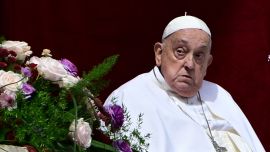On Sunday July 30, President Alberto Fernández gave a long interview to journalist Raúl ‘Tuny’ Kollmann on Radio 10 in Buenos Aires. Many in Argentina might not have heard about it, nor what he said. There is a simple explanation: hardly any national media outlet covered it.
Just a few minutes after the chat with the head of state, Central Bank Governor Miguel Ángel Pesce took to the airwaves for his own interview. Oddly enough, that conversation was covered across the country by many outlets, even when on paper Pesce’s position is far below the level of the Presidency. Alberto Fernández’s communications team thought so too, and called up a few journalists to complain that no-one had divulged the words of the outgoing head of state.
Even though this is no more than an anecdote, it reveals so much more than that: it is a thermometer regarding Fernández’s political presence, the powerless president who is fighting against ostracism by filming Q&A video sessions for his social media accounts from the gardens of the Olivos presidential residence. Even in those situations, the Peronist leader is not the star: that tag belongs to his dog, Dylan. That is how the last few months of Alberto Fernández’s spell in power are being spent – in his own words, “he has tried to stay out of the campaign.”
It is true that, from a distance, the whole situation is quite striking. From the outset, the president secured his position thanks to votes that were not his. Fernández is the first not to truly seek re-election since the return to democracy (the exceptions are Fernando De la Rúa, who had to finish his administration early, and Raúl Alfonsín, as that constitutional tool did not exist at the time). In truth, he has become a more ceremonial ruler than an actual head of State – power has been held by Economy Minister Sergio Massa since he was appointed in late July last year.
At least those are just the facts. In Fernández's head, the situation may look different. Firstly, because the man is clinging to the idea that the big drama was not his administration or leadership, but rather something which, at some point, is borderline esoteric: the misfortune of leading a government that coincided with a pandemic, a war and a drought. In his inner circle, they say that the drought, which greatly affected the economy, is one of the reasons Alberto has given up again. It explains why he did not run for re-election, they say. “I just got four horrible years,” says the president.
When he gets his self-esteem back, Fernández brags about certain topics. For instance, that he managed to squeeze vice-presidential candidate Agustín Rossi onto the ticket. That he managed to secure two loyal officials good places on the ruling coalition’s list for national deputies in Buenos Aires Province (Victoria Tolosa Paz and Santiago Cafiero). All three are ministers in his Cabinet, a tacit approval of his administration, in his view.
The Peronist leader also names other achievements. His thesis of having their own PASO primary within the bloc came to pass, which is a double victory – there was no candidate hand-picked by Vice President Cristina Fernández de Kirchner either. Will the president’s famous and historic words to Roberto Navarro, about “putting an end to 20 years of Kirchnerism” actually happen? If that were the case, it remains to be seen how Fernández would take it. Would he celebrate it or be sorry about it?
At any rate, the president’s daily schedule is more practical. In the last few weeks, besides answering anonymous users’ questions sent to his Instagram account, he took some time to call an injured Argentinos Juniors footballer (the club he has always supported) to find out how his leg was recovering, and took time to surprise journalist Ernesto Tenembaum on his 60th birthday, granting him an special interview.
President Fernández, who seems to have made the decision to avoid appearing at campaign events as little as possible (the same goes for his partner Fabiola Yáñez), is keeping a low profile domestically. He will be able to enjoy some international trips before his time is up though. Along with this week’s trip to Paraguay for President Santiago Peña’s inauguration, there will be time for one last presidential tour before leaving office. He will travel to the United States, Chile and China, and there are rumours Cuba and South Africa may be added too. It will be his farewell tour.



















Comments